Edwards on Climate Change
Air Date: Week of November 30, 2007
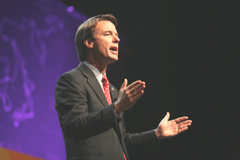
(Photo: Laura Kleinhenz)
If he were president, what would John Edwards do to combat climate change? Living on Earth host Steve Curwood moderated the first-ever presidential candidates forum on global warming, where former Senator Edwards answered just that question. Tune in for the second installment of our coverage of one of the most serious issues the next commander-in-chief will face.
Transcript
CURWOOD: It’s Living on Earth. I’m Steve Curwood. On November 17th, I was proud to represent Living on Earth as the moderator of the first-ever presidential forum on global warming. This was a chance for the presidential candidates to lay out how they would respond to the challenge of global warming if they make it to the White House.
The Republican and Democratic candidates were all invited. Only three—all Democrats—showed up: Senators Hillary Clinton and John Edwards, and Representative Dennis Kucinich. Each of the candidates gave an opening statement, and then was questioned by a panel—Mary Nichols, chair of the California Air Resources Board, David Roberts of the online magazine Grist, and me. Today we are airing excerpts from Senator John Edwards’ appearance.
[APPLAUSE]
EDWARDS: Thank you. Thank you. You all have been at the forefront of fighting global warming, and this forum is another one of many examples of your doing what’s necessary to raise awareness about this issue, raise awareness about this crisis, and to inject it into the center of the debate, which it should be in this campaign in this election. We need a president who will be straight with the American people about the challenges and the opportunities that all of us face when it comes to global warming.
[APPLAUSE]
EDWARDS: Two weeks from now, America will send a delegate to the United Nations Conference in Bali with no ideas and no solutions. It is embarrassing for the United States of America to be in that position.
[APPLAUSE]
EDWARDS: Throughout this campaign, I’ve been very clear about what I think we need to do to face this challenge. I’m proud of the fact that I came out very early and very aggressively about what we need to do to attack global warming. I said then that we need to cap greenhouse gas pollution starting in 2010 with a cap-and-auction system and that we need to reduce it by 20 percent by 2020 and 80 percent by 2050, that we need to lead the world in a new global climate treaty, that we need to meet the demand for more electricity through efficiency for the next decade, instead of producing more electricity. And we need to create a new energy economy fund to support U.S. research and development in energy technology and other advances by auctioning off $10 billion of greenhouse pollution permits and repealing $3 billion in oil company subsidies.
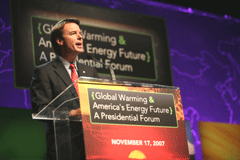
Senator John Edwards at the Presidential Forum on Global Warming and America's Energy Future. (Photo: Laura Kleinhenz)
EDWARDS: Now, I have heard some politicians talk about a cap-and-trade system as not going far enough, as a way to avoid the word ‘tax.’ But I believe that candidates running for president need to be straight with the American people about exactly what we’re proposing. We’ve had enough doubletalk, we’ve had enough politician talk. We need to be honest with people. The truth is that carbon caps will have an impact on the cost of fossil fuels. Anyone who pretends that’s not true is not being straight with America. And by the way, it is a political strategy that is absolutely doomed to fail because we are never going to get the change we need by pretending that this is going to be easy and that no sacrifice will be required. The truth is—
[APPLAUSE]
EDWARDS: The truth is that the big change we need will not be easy. It’ll take the sustained commitment of a generation of Americans. The American people understand that, and we need a president who will challenge them to be part of the solution, not patronize them by pretending that the problem doesn’t exist or that some politician can solve it for them. Right now, we’re not just turning a blind eye to global warming, we’re also missing an opportunity to lead the world and reclaim the spirit of American ingenuity that has driven great advances and helped us overcome great challenges in the past.
Right now, we’re sitting by the side of the road, as foreign companies race ahead with developing green technology. Bell Labs invented the solar cell in New Jersey in 1954, but today, 90 percent of solar panels are manufactured overseas. China’s even produced a solar billionaire. General Motors made the first modern electric car, but today, Toyota and Honda lead the world in producing hybrids. Just last week, I saw this headline: ‘Foreign Firms Envision Windfarms Dotting The U.S.’
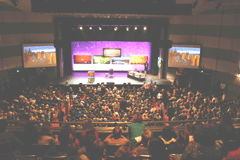
Los Angeles' Wadsworth Theatre shortly before the climate change forum began. (Photo: Laura Kleinhenz)
EDWARDS: Why should foreign firms be the ones taking the lead in building windfarms here in America. Why is that not being done by American firms?
[APPLAUSE]
EDWARDS: If we take the steps that I propose, American entrepreneurs and manufacturers can lead the world in developing the green technology we need to generate clean, reliable energy and to use it more efficiently. We need to let entrepreneurs try a thousand different approaches, not centrally-planned government handouts. Let me give you a few examples of exactly what I mean.
First, I will cut carbon welfare subsidies for oil companies to raise money that will be invested in renewable fuels like wind, solar, biofuels, and turbo charging our energy efficiency technology. Second, I’ll spark a new era of innovation and competition by modernizing our electricity grids. New, smart grids will let entrepreneurs create renewable energy and then to sell it back into the grid. They will also be safer, more efficient, and more reliable. Third, I will seed innovation by giving low-interest loans to homeowners and small businesses for new technologies like solar, hot water, and electric systems. These systems are expensive, as all of you know, up front, but they pay off for families in the long run, particularly when excess power can be sold to their neighbors. Fourth, I’ll create a new market for energy efficiency. Right now, utilities profit from selling electricity, but have absolutely no incentive to help their customers use less energy.
Now, don’t get me wrong. Getting to the new energy future that all of us want to see happen for this country that we love so much will not be a cakewalk. It’s true that the steps we have to take will cost money. It’s true that some of these steps we need to take will mean higher energy prices. And given the scope of the crisis, there may be further steps that we need to take down the road. Every time we get new, up to date, scientific information, it indicates that global warming is more of a crisis than we thought before. But, in the end, families can come out ahead if they switch to renewable fuels, use energy efficiently and make smaller sacrifices in their own lives. I think we’re ready for that. I think, actually, the American people are ready for a president who calls on them to sacrifice and asks them to be patriotic about something other than war.
[CHEERS AND APPLAUSE]
CURWOOD: After the prepared remarks, the panelists—Mary Nichols, David Roberts and I—questioned the former Senator.
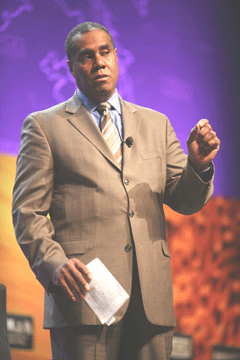
Steve Curwood moderated the forum. (Photo: Laura Kleinhenz)
CURWOOD: Thank you Senator.
EDWARDS: Thank you.
CURWOOD: You’re calling on people to sacrifice. How do we get there? How, as president of the United States, how do you get America to sacrifice the way you feel that we should in order to accomplish your objectives?
EDWARDS: Here’s my response to this. Having now spent—it seems like the last eight years campaigning around the country—I’ve been talking, but not just talking, I’ve been listening. The American people are actually hungry to do something as a national community. The problem is no one has asked them to. I mean, after September 11th, George Bush said, ‘go shopping,’ right? What Americans want, and you can see it, the evidence is everywhere. I mean, really—you saw the response immediately after September 11th of the American people. I’m not talking about the government. You saw what happened when the hurricane hit the Gulf Coast. I mean, the government was an incredible mess, but Americans went down there, contributed, volunteered. I took 700 college kids who gave up their spring break, literally, just to go to New Orleans and help rehabilitate houses. I mean, I think there is a huge hunger and desire in America to take action. And I still remember and I know a lot of you do, the famous John Kennedy speech, ‘Ask not what your country can do for you.’ Well, that’s where we are today. We need a president who will look America in the eye and say: ‘we’re not going to be careful anymore, we’re not going to be politically cautious, we’re not going to look at polls to figure out what I’m supposed to say to you.’ We know what needs to be done—
[APPLAUSE]
EDWARDS: -- and I’m going to call on you to be willing to sacrifice, to make America what it’s capable of being. But I will say, I think, that we have to recognize something which will probably creep into every answer to every one of your questions, which is—the government has become corrupt and we need to be honest about that.

(Photo: Laura Kleinhenz)
EDWARDS: Why does America not attack global warming in the way that we need to? We know why we haven’t—oil companies, power companies, gas companies, and their lobbyists in Washington, D.C. and all of these big challenges that America faces, it’s going to be impossible to be successful in responding to those challenges, unless we have a president who tells America the truth and says to America: ‘we don’t have to stand quietly by and let this narrow, well-financed group of interests run your government.’ We don’t.
[APPLAUSE]
EDWARDS: We can actually go out and reclaim this democracy and when we reclaim this democracy, when we reclaim the democracy—together, I’m not talking about just me—when we, when somebody believes, when the president of the United States actually believes in the power of America, not just the power of the presidency, who believes that the power’s out here in communities like this and what we need to do is go out, galvanize America and go into Washington, D.C., reclaim this government, reclaim this democracy, and take the power out of the hands oil companies, gas companies, Exxon-Mobil, and their lobbyists in Washington, D.C.
[CHEERS AND APPLAUSE]
EDWARDS: We can beat these people, but we have to be willing to take ‘em on.
[APPLAUSE]
NICHOLS: Okay.
CURWOOD: Thank you, Senator. Mary?
CURWOOD: Mary Nichols.
NICHOLS: As President Edwards, in addition to taking on the oil companies and the coal companies, etc, I think you’re going to find that in talking about sacrifice and building that mandate for the shared sacrifice that you referred to, that the burdens and the benefits are not necessarily spread equally across this country, geographically or in terms of people’s careers. And in certain parts of the country where coal is something that for people there is the only or the major source of jobs, maybe the only or major source of fuel for their power plants that they, that they live by, that making that switch may be a little tougher than it is for other places. So, how do you address that in terms of building and bringing together the kind of coalition that you’re going to need to get this done?
EDWARDS: Well, let me answer the question you’re asking directly, but I also want to broaden it to the bigger question of how we can use this transition to also help in more economically deprived areas in America. As to coal—I came out very early and very aggressively saying that America should not be building more coal-fired power plants until we have the ability to sequester the carbon—
[APPLAUSE]
EDWARDS: -- and to store it and we have the capacity to do it. And I do think, for those families and those communities and those regions that are most impacted, we should use, and we’re making the polluters pay, which should generate a minimum of $30 billion in the cap-and-trade system, we should use a chunk of that money to go in to revitalize those communities, to help them, to help them transition, to help support the families. But I think we can do much more than that.
As we make this transition from a carbon-based economy to a green economy, I think all of us believe if we do it in a smart way, we can generate a minimum of a million new jobs and maybe upwards of two million new jobs. And the question is: where will those jobs be located? And my view is we ought to work very hard to generate those jobs and to generate that economic development in the places where people are suffering the most economically.
[APPLAUSE]
EDWARDS: In poor rural areas, in poor inner-city areas, I mean, clearly, this is a great opportunity to create jobs—good, middleclass jobs, that will be able to support a family. And when we talk about the sacrifices that we’re, that I, as President, will be asking Americans to make, we also have to make sure that they understand that there are extraordinary opportunities here. We can make certain that those opportunities are generated in the places where people are struggling the most and a lot of you know this already—poverty is a huge cause in my own life personally and I believe it’s a national embarrassment that we have 37 million people who wake up every day worried about feeding and clothing their children.
[APPLAUSE]
EDWARDS: We have 35 million, according to a report that literally came out a couple of days ago, we have 35 million people who were hungry last year. In America? How in the world are we going to tolerate this? We have to do something about it, and we can use this transition to a green economy to accomplish at least part of that.
CURWOOD: Quick follow up, Senator. As a quick follow-up to this—did I get this right? If the rights to pollute—to release carbon—were auctioned off, you’d take those funds to pay for the rebuilding of the lives of peoples who will have their jobs or their industries or their neighborhoods dislocated by the reduction of carbon in our economy?
EDWARDS: A portion of it. Now a portion of it, a sizeable chunk of it is going to go to invest in wind, solar, cellulose-based biofuels, to the making certain that American car companies are building the most innovative vehicles on the planet. And to making sure that we’re developing the technologies that we need to develop to make the transition. But some of that money can clearly be used because beyond that—what I’ve proposed is about 13 billion of the 30 go into that—beyond that, a sizeable chunk of money can be used to help these communities—
CURWOOD: Enough so that no one would lose their standard of living?
EDWARDS: Enough so that we would provide all the support we can. I can’t make that promise. I don’t know if that’s true or not.
[APPLAUSE]
ROBERTS: Thank you, Senator.
CURWOOD: David Roberts of Grist Online.
ROBERTS: We’ve been talking these last two questions about equity and fairness inside America during the transition but the question of equity and fairness internationally is even more stark—the divide between winners and losers. A certain amount of change, climate change, is inevitable already built into the system, and those impacts are going to hit the world’s poor and vulnerable very hard. There’s nothing we can do at this point to prevent those changes. What can America do to help lift up those parts of the world that are going to be hit worst by the changes that we had a substantial hand in creating?
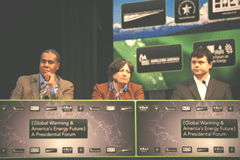
(L-R) Moderator Steve Curwood and panelists Mary Nichols (California Air Resources Board Chair) and David Roberts (Grist.org.) (Photo: Laura Kleinhenz)
But I think first of all we have to be willing to invest in a way that we’re not investing today. And we know some of the things that need to be done—you know, to raise up roads, bridges, maybe some walls need to be built to provide protection. And we know some of the more drought-resistant irrigation techniques, more drought-resistant crops. I mean, I think those are some of the things that in the third world America needs to be developing.
But can I just go for a moment go outside global warming? But it’s a connected issue. It is, you talk about the poorest countries in the world being the ones that will struggle and suffer the most as a result of climate change. But that’s true of everything. I mean, they suffer the most in every conceivable way. Half of the planet, three billion people, live on $2 or less a day. The abject poverty that exists in Africa, in parts of Asia, in some parts of Latin America, are heartbreaking. And I think if most Americans saw it, they wouldn’t think it’s tolerable. It’s not tolerable. And the idea that America can be a leader in isolation on global warming without actually being a moral leader on all the big issues that face the world, I think completely misunderstands what leadership is.
[APPLAUSE AND CHEERS]
EDWARDS: And if I—and I don’t want to stray too far from the subject, but if I can just take 60 seconds. Some of the things that America should be doing: we should be leading an international effort to make education available to 100 million children in the world who have no education.
[APPLAUSE]
And particularly in Africa, but not just Africa. We should be helping stop the spread of disease; we should have at least $50 billion over the next five years invested in HIV/AIDS and making certain that education is being provided and the treatment is being provided around the world. We should be, simple things like clean drinking water and sanitation—I know myself from the work I’ve done with the International Rescue Committee in Africa—would make an enormous difference, an enormous difference. Things that all of us take for granted—and economic development. Things like micro-lending and micro-financing. The only way America is going to be a credible leader on huge issues, crisis issues like global warming, is the world has to see us as a force for good in the world again. They need to see America doing big and important things, not just for ourselves, but for humanity. Thank you all very much. Wonderful to be with you! You’re terrific!
CURWOOD: Senator John Edwards at the Presidential Forum on Global Warming and America’s Energy Future in Los Angeles. To listen to the entire presidential forum, go to our website loe.org. In the weeks ahead we’ll hear from Representative Dennis Kucinich. The event was organized by groups affiliated with the League of Conservation Voters, the Center for American Progress, the Natural Resources Defense Council, and the Presidential Forum on Renewable Energy. And special thanks to panelists Mary Nichols of the California Air Resources Board and David Roberts of the online magazine Grist.
Links
Rough transcript of "A Presidential Forum: Global Warming & America¹s Energy Future"
John Edwards' Energy and climate plan
Dennis Kucinich's Energy and climate plan
Hillary Clinton's Energy and climate plan
Forum panelist and Grist Magazine staff writer David Roberts' reflections on the event
Living on Earth wants to hear from you!
Living on Earth
62 Calef Highway, Suite 212
Lee, NH 03861
Telephone: 617-287-4121
E-mail: comments@loe.org
Newsletter [Click here]
Donate to Living on Earth!
Living on Earth is an independent media program and relies entirely on contributions from listeners and institutions supporting public service. Please donate now to preserve an independent environmental voice.
NewsletterLiving on Earth offers a weekly delivery of the show's rundown to your mailbox. Sign up for our newsletter today!
 Sailors For The Sea: Be the change you want to sea.
Sailors For The Sea: Be the change you want to sea.
 The Grantham Foundation for the Protection of the Environment: Committed to protecting and improving the health of the global environment.
The Grantham Foundation for the Protection of the Environment: Committed to protecting and improving the health of the global environment.
 Contribute to Living on Earth and receive, as our gift to you, an archival print of one of Mark Seth Lender's extraordinary wildlife photographs. Follow the link to see Mark's current collection of photographs.
Contribute to Living on Earth and receive, as our gift to you, an archival print of one of Mark Seth Lender's extraordinary wildlife photographs. Follow the link to see Mark's current collection of photographs.
 Buy a signed copy of Mark Seth Lender's book Smeagull the Seagull & support Living on Earth
Buy a signed copy of Mark Seth Lender's book Smeagull the Seagull & support Living on Earth

